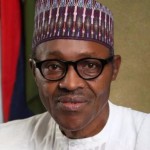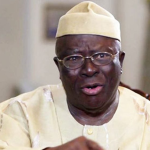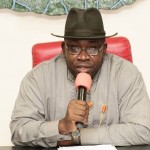I Shall Be Leaving Nigeria with Excellent Impressions –German Envoy
Featured, Latest Headlines, News Monday, August 1st, 2016
The out-going Ambassador of Germany to Nigeria, His Excellency, Michael Zenner, spoke with Eric Ojo, Abuja Chief Correspondent of African Examiner on his tenure in Nigeria and a broad range of other pertinent issues relating to the bilateral relations between Germany and Nigeria.
Excerpt:
Your Excellency, in the next few days you will round off your tenure as the Ambassador of Germany to Nigeria. How has these two years in Nigeria been for you?
For me, Nigeria was the first country in Africa where I have been posted to and I think these past two years have been very interesting and encouraging experiences in many areas. In particular, if you meet people who are absolutely friendly, you can talk to each other and you meet many dynamic people, I think that makes the country very vibrant. The initiatives and the dynamism of the Nigerian people is very, very important. My wife and I made many friends in Nigeria to the extent that barely few weeks after our arrival in Nigeria we felt already at home. Germany and Nigeria, are both federal republics. So, we know about the diversity of the regions, we have it in Germany and you have it in Nigeria. It was therefore, very important for me to travel around Nigeria in order to get to know the whole country and not seeing Nigeria only from the Abuja perspective. That is something really important. As I said earlier, I had very interesting, encouraging experiences and I got very deep impressions of Nigeria in the past two years. This is one of the most significant aspects. When, I leave the country, I am leaving behind many friends. From the professional point of view, it was as well very interesting, challenging and encouraging. We have a Bi-National Commission between Nigeria and Germany since 2011. A few weeks after my arrival, we had a meeting of Foreign Ministers in Berlin. Shortly afterwards, the German Foreign Minister, together with the Foreign Minister of France visited Nigeria. Bilaterally, the main event during the two years, was the visit of the Federal President of Germany Joachim Gauck to Nigeria this year. He was in Lagos and Abuja. Very important as well is to learn about Nigerian domestic policy, Nigerian economy and the Nigerian culture. If you are in a country during election campaigns, you will learn very fast about all aspects of the domestic policy. The elections in different states and the general elections last year in Nigeria were very important in this respect. It is very noteworthy that the elections and the democratic transfer of power were conducted in a very peaceful, democratic, non-violent and fair way. That is a very important signal to many other countries. Nigeria is the most important country in Sub-Sahara Africa and every day I learned more about it. However, it is part of the job that someday, you have to leave. I shall leave Nigeria with excellent impressions.
Before your arrival in Nigeria or Africa you must have had other impressions about the country. Did what you see on the ground resonate with those impressions?I came to Nigeria completely open-minded. I did not want to be influenced by some images floating around in the media. My own impressions from the first day of my stay here in Nigeria were really good. The cultural life in Nigeria is very vibrant. You see it in Lagos, which is the city of the movie industry. Here in Abuja, it is very important to note that, the German Embassy together with our French friends and partners, the French Cultural Institute, started and promoted a new cultural initiative that featured concerts, movie
presentations, dance theatre presentations, drama and art exhibitions. We really managed to attract young Nigerians who are interested in art and culture. It is very important that we understand the cultural relations as dialogue. That means that German culture really meets Nigerian and African culture. For example, German and European artists work together with Nigerian and African artists. Nigerians who live in Europe, for example, a professional fashion designer who lives now in Berlin, organized with us a fashion show here in Abuja. The other day a Nigerian dance choreographer living in Paris and working as well in Germany (Berlin) organized with the French and the German Embassy a performance of dance theatre here in Abuja and workshops for young Nigerians. All these activities clearly show how closely linked our relations are.
What are you going to miss most in Nigeria by time you leave for your new assignment?People! I will surely miss people. My wife and I have to leave many friends behind.
Can you give us an update on the bilateral trade between Germany and Nigeria in the last two year?
The overall trade volume between both countries when I arrived in Nigeria was about 5.5 billion euros. But the trade relations dropped during the last two years in absolute figures due to the decline of the oil price because most of Nigeria’s export to Germany is crude oil. Most of our exports to Nigeria are machineries, investment goods, goods, cars, lorries and some consumer goods. But, I am very confident that this decline will turn around again in particular with the diversification policy in the Nigerian industry and economy if it has more opportunities for exports. If you diversify an industry or economy, you need machineries, you need cooperation with companies with expertise in different areas. For example, in the agricultural sector, we have an intensive technical cooperation in order to improve the value chain from the production to the marketing aspect. If you set up food industries, you need machineries for food processing. That is an aspect where German companies have very good experience. We have about 100 German companies who are very active in Nigeria. Most of them have representations in Lagos. But Nigeria is also focusing on solid minerals. Here Germany has a very vast experience. Not only in production of machineries we can offer also partnerships with universities, polytechnics and technical high schools in the mining sector. For the power sector, we have the energy partnership between Nigeria and Germany. It is two-fold. One aspect has to do with private sector participation. For instance, near Benin City Edo State, there is currently a gas power plant under construction. The other area is the solar energy and the renewable energy sector where the GIZ, the German development agency, is very active in giving assistance, advise and consultancy to Nigerian partners. This is done, particularly in order to offer solutions to villages and small towns not connected to the national grid so they can produce power independently. If they are once connected, they may sell their generated surplus to the national power grid. We are also very engaged in consultancy regarding the small and medium scale industries which is very important for the diversification of the Nigerian industry. We equally participate in the Nigerian Development Bank with $200 million. We have vocational training projects. One of the reasons for the success of the German industry is vocational training and the activities of medium scale companies who are very innovative. In vocational training we have projects in Lagos, the Representative of the German Industry together with two Chambers of Commerce. The GIZ is equally involved in vocational training projects also on behalf of the European Union (EU). There are some private initiatives too. Vocational training is very important because you need people who are able to participate actively in the economic diversification process and you can increase the employment rate. I am very happy that a delegation of governors from Nigeria will travel to Germany in order to have first-hand information on vocational training in Germany. They will also see renewable power projects, food processing and other trade and investment related issues. I think this is very important so that we can have a very active exchange of views to deepen our bilateral cooperation.
The German government had in the past supported the Nigerian healthcare delivery system. Are there on-going or new projects in that regard?
We assisted Nigeria shortly after the Ebola outbreak two years ago. I think, it was a good and efficient support that Germany provided at that time, in particular with laboratories that could analyze the samples very quickly. Germany is furthermore involved in projects against infectious diseases, not only bilaterally but as well within the framework of the Economic Community of West Africa States (ECOWAS) where Nigeria is the biggest member state. We also participate to a very large extent in the polio vaccination programme which is now eight consecutive sub-programmes.
During your stay here, Nigeria faced many security challenges. Was there any way your country assisted Nigeria?
In the North East, the Boko Haram insurgency and terrorism is a huge challenge. All over the world, we face global terrorism and we have to cooperate in fighting against it by combining and coordinating all our efforts. One of the results of the G7 outreach meeting in June 2015 in Elmau, Germany, which H.E. President Buhari attended on the invitation of the German Chancellor, was the coordination of the fight against terrorism in the North East region. Germany assists, for example, Nigeria with mobile health care units, mobile radar systems and demining equipment. Germany thinks already on the next phase too, the rehabilitation of the North East. We earmarked already a certain amount of funds to assist this process in order to enable people to go back to their villages in the North East the moment conditions allow it. The GIZ is implementing this not only in respect of a German national contribution but also on behalf of the EU. But until people are able to go back we are trying to assist the Internally Displaced Persons (IDPs) with food aid via programmes facilitated, for example, by the United Nations High Commission for Refugees (UNHCR), the World Food Programme, other agencies and Non-governmental Organizations (NGOs). We try to help also people who got traumatized by the Boko Haram terror with particular programmes in cooperation with the International Office for Migration (IOM).
Did you at any time feel insecure throughout your stay here in Nigeria?
No, not at all. I read a lot of things in the newspapers on the increasing rate of insecurity in the different communities in the country. I personally did not face such threats.
Where is your next destination on your diplomatic service?
I am crossing the Sahara from the Southern border of the Sahara to the Northern one. I am appointed as German Ambassador to Algeria.
Are you happy that you are moving to another Africa country after Nigeria?
During my time in the foreign ministry I worked quite a lot in EU affairs and I got addicted to the EU because I think regional integration is very important for peaceful relations between countries. It promotes the ideals that people should live peacefully together. I think that is very important, especially after centuries of bad experiences we had in Europe. The EU is a success in my opinion. I think that regional integration is also economically very important. But I thought one day, I should go back to the ideas I had when I started my career in the Foreign Service. I wanted to serve in a country outside of Europe and further away in order to have new experiences. I think, it is also good to see Europe from the outside. So I was very happy when I was asked whether I will like to go to Nigeria. Aside from my experience in Nigeria which I have already described, I am impressed to see how integration is moving forward in the Economic Community of West African States (ECOWAS) region. ECOWAS is the most advanced integrated region in Africa. That is very important. People can travel within the ECOWAS region without any problems. There are also important benefits such as trade, jobs, healthcare, maritime security. Therefore, I was very happy that I could serve in your country.
Are there specific projects or legacies you would want your successor to continue and consolidate?
There are elements of continuity which are fixed. For example, the narrow cooperation in
the Bi- National Commission, cooperation against global terrorism, economic cooperation. Additionally, in my opinion culture also a very important element in relations between countries because it helps people to understand each other better. So I was very much engaged in this area.
African Examiner
Related Posts
Short URL: https://www.africanexaminer.com/?p=34648






















